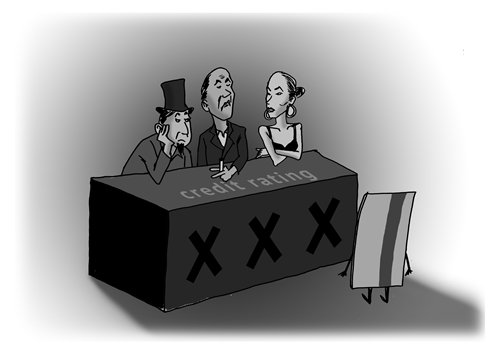
Illustration: Luo Xuan/GT
The credit rating industry has a history of 158 years, but it is currently dominated by three major rating agencies controlled by US capital: Standard & Poor's, Moody's and Fitch Ratings. The three companies share about 90 percent of the global market.
The importance of the "big three" is not in doubt, but they have often been heavily criticized. One problem is that their credit rating methods are based on the Western political and economic system, and this is sometimes hard for emerging economies and developing countries to accept.
The procyclical rating method used by the big three could be compared to hitting a man when he's down. During the Asian financial crisis (1997), the US subprime crisis (2008), the Greek debt crisis (2009), the European debt crisis (2009) and other world events, successive gloomy ratings arguably played a role in fueling and prolonging the crises.
The agencies have been accused of unfair rating results, manipulating the pricing power of the international financial market and hurting the interests of other countries and investors.
Another issue is that the dominance of the big three has led to a lack of vitality and efficiency in the global credit rating industry. This brings the risk of bottlenecks in the development of the industry.
In spite of the rise of the anti-globalization trend in recent years, economic integration and trade liberalization are in line with the world's development trend.
In May 2017, the 100-Day Action Plan under the Sino-US Comprehensive Economic Dialogue was jointly released. As part of the plan, China agreed to allow wholly foreign-owned financial services firms in China to provide credit rating services and to begin the licensing process for credit investigation by July 16, 2017.
This underscored China's determination to embrace full competition in the credit rating market. Amid the process of globalization, the global credit rating industry is quietly facing a new round of adjustment, and the new order under the WTO's framework of complete competition is gradually being formed.
The rating industry should have a new face. In addition to the big three, different voices should also be respected. It is necessary to create a new type of cooperation between major countries to achieve win-win cooperation. The new influential rating agencies should integrate elements of the EU, emerging economies, countries along the route of the Belt and Road initiative and underdeveloped countries to form a more open and inclusive rating agency system.
There should also be new arrangements. For instance, credit information should be shared among credit rating agencies, in order to reduce the asymmetry of credit information. And there should be integration of credit information data resources to ease the "digital gap" between countries and regions, which would gradually allow mutual recognition of credit rating results.
International regulatory cooperation should also be strengthened to jointly protect state secrets, trade secrets, personal privacy and other credit information. And there should be a crackdown on violations in the industry, such as rating exaggeration or accepting money to inflate ratings.
There should be new adjustments to the rating rules. The theories behind ratings need to be more rational, inclusive, objective and fair. Rating standards should abide by the values that the world basically agrees with, while also taking into account the different demands of developed countries and developing countries.
The rating process should fully consider the characteristics of the macroeconomic cycle, micro-industry characteristics and regional differentiation, and improve the transparency of credit rating information and comprehensive pricing. The rating results should overcome the drawbacks of rating adjustments in procyclical and sensitive periods, enhance forward-looking risk warnings and reduce unreasonable external effects.
There should be new discoveries in rating technology. The credit economy has driven the market economy to a more mature stage, and credit issues in the mature market economy are becoming more subtle and complex.
Sovereign credit ratings should not be politicized or become a new tool for political and economic hegemony. Debt credit rating technology should also keep pace with the times and strive to apply new technologies such as big data, cloud computing, mobile internet and artificial intelligence to credit information collection, default probability calculation, and dynamic credit management.
The author is a research fellow at the Chinese Academy of International Trade and Economic Cooperation. bizopinion@globaltimes.com.cn
